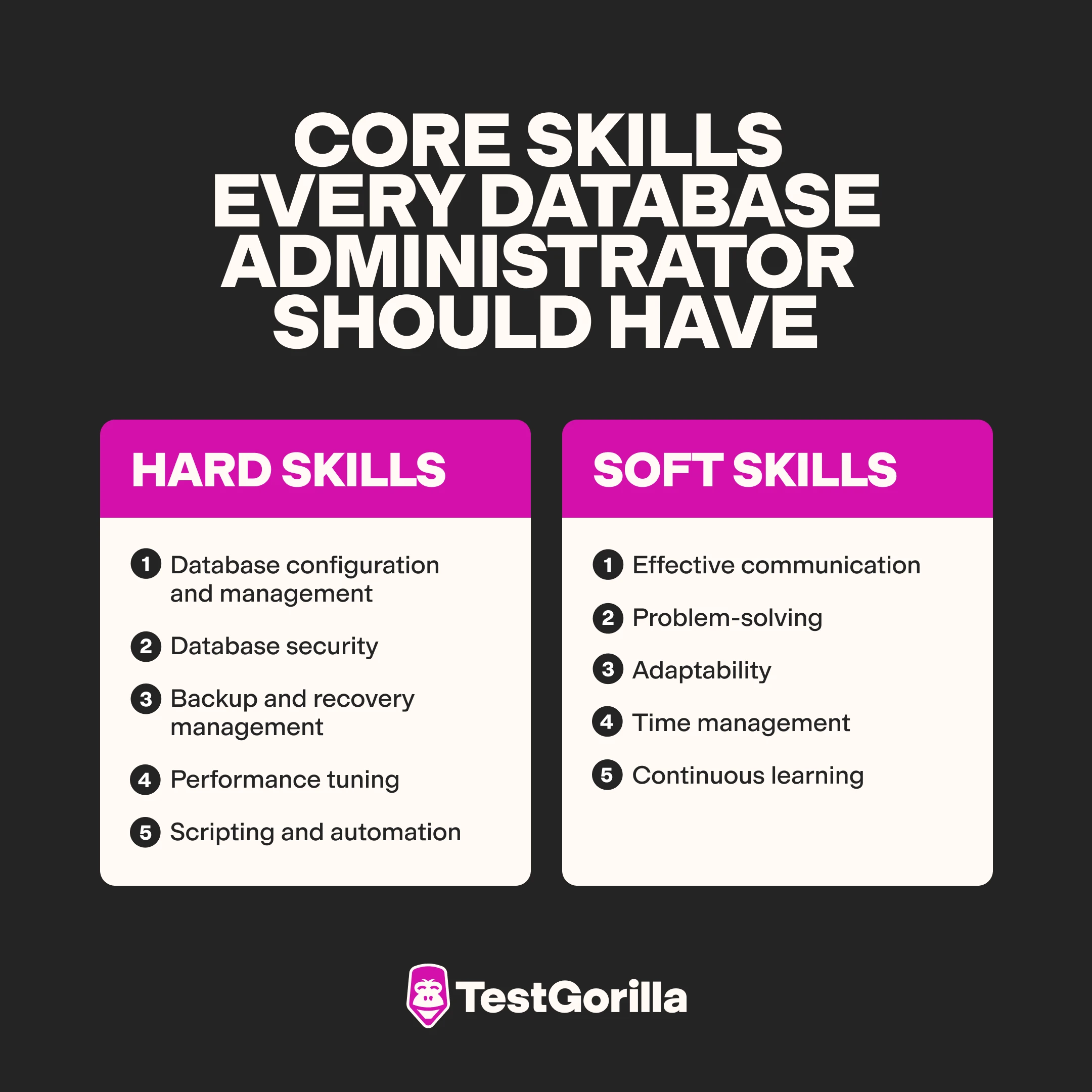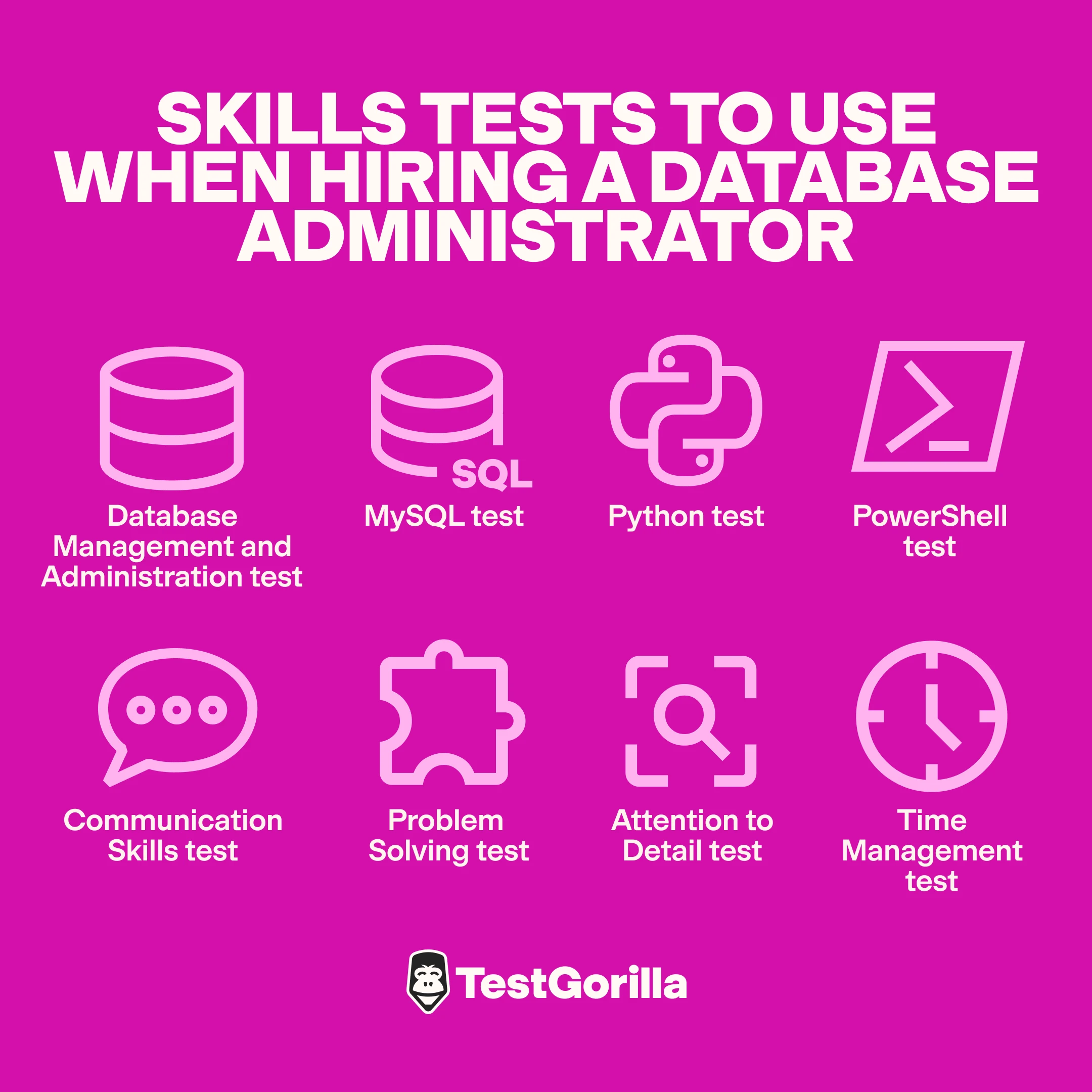Your databases are everything. They’re the digital filing systems that contain all the information your business needs, and your database administrator is the person who keeps them secure and functioning. So if you need to hire a database administrator, how do you make sure your candidates are up to the task? The answer: You must check their skills.
Knowing the exact skills they need isn’t as simple as it sounds, though, as they require a tricky mix. But failing to understand and assess these skills can lead to a bad hire. The result? Data loss, inconsistent performance, and security breaches – a nightmare you want to avoid.
We’re here to help. Our article walks you through which skills database admins need and how to assess them. This way, you hire someone who really has the chops to manage your database.
What is a database administrator?
Your database administrator (DBA) is the person who makes sure your databases are secure and performing at their best. They’re responsible for setting up and maintaining databases so your organization can rely on them to work just right.
DBAs spend their days on the following tasks to make sure everything stays on track:
Monitoring database performance
Applying updates and patches
Managing user access
Creating security measures to prevent cyber threats
Troubleshooting issues so there’s little to no database downtime
Making sure your database software is working properly
Database administration is a team effort, so DBAs coordinate with different teams. From the IT department to the security team, various groups work together to help DBAs carry out all these tasks.
Core skills every database administrator must have
These are the skills you should look for when writing your database administrator job description and assessing your applicants.
Hard skills
These hard skills help your DBA effectively manage and secure your databases:
Database configuration and management for setting up and keeping your database running smoothly using cloud-based platforms like Azure
Database security to put measures in place that protect your database from threats and hackers
Backup and recovery management to handle backups – so you can avoid losing data and create plans to recover data if the unfortunate happens
Performance tuning to tweak settings and queries so the database works faster
Scripting and automation
using SQL, Python, or PowerShell to make your database more efficient
Soft skills
These soft skills make it easier for your database admins to work with your teams to maintain your database:
Effective communication to explain technical stuff in a way that non-tech folks can understand
Problem-solving to tackle and sort out tricky database problems without causing too much disruption
Adaptability to learn new tech and adjust to changes in what the business needs
Time management to stay on top of tasks, manage workload, and meet deadlines
Continuous learning so they can learn and use the newest database tech rollouts as they come onto the market
The best insights on HR and recruitment, delivered to your inbox.
Biweekly updates. No spam. Unsubscribe any time.
How to assess database administrator candidates
The first thing you might do when you’re screening DBA candidate applications is read their resumes. Unfortunately, this process isn’t very effective, as you could wind up progressing candidates with impressive resumes who actually lack the skills you need. On the flip side, you could end up dismissing applicants who don’t have shiny resumes but do have the right skills.
To make sure you hire someone who can handle the job, use talent assessments. TestGorilla’s talent discovery and testing platform can help. We offer 350+ tests, including tests for database administrators.
With our platform, you can merge up to five tests (plus your own questions) into one talent assessment for your DBAs. Once assessment scores come in, you can quickly spot the candidate who can keep your databases running smoothly.
Here’s how you might use our platform to assess your candidates.
Look into their hard skills
Make sure your database administrator candidates have the practical skills needed to manage and secure your databases. You might use these tests:
Database Management and Administration test: This one lets you see if they can handle databases well enough to meet your needs.
MySQL test: This test checks if they can use MySQL to manage and organize data properly.
Python (Debugging) test: This test shows you if they know how to fix a buggy Python script.
PowerShell test: This one lets you see if they understand PowerShell’s scripts and how to write them.
Measure their soft skills
Consider using these TestGorilla tests to assess your candidates’ soft skills:
Communication test: This checks if they can listen well and communicate clearly.
Problem Solving test: This shows you if they can think through problems and fix them quickly.
Attention to Detail test: This test lets you see if they can catch mistakes by paying close attention to textual details.
Time Management test: This one checks if they can manage multiple tasks and meet deadlines.
Look at their culture add
Aside from stellar database management, what else will your candidate add to your organization? How will they impact its culture? Will they bring in fresh approaches to data use, or will they come with the same old tricks?
Your DBAs need to work well with all teams, but they also need to positively impact the culture of your organization. It’s up to you to determine if they can do that.
A Culture Add test in your hiring arsenal makes it easier to understand your candidates’ values and behaviors so you can see the kind of person you’ll be adding to your team.
Use interviews
Finally, ask them interview questions about their past behaviors. This prompts them to tell you how they handled real-world situations in the past.
For example, to assess their backup and recovery management skills, you could ask:
Can you tell me about a time when you set up a new backup and recovery plan for a database? What did you do, and how did it help the organization?
This question helps you see their experience and approach to managing database backups and recovery.
You can also present them with made-up scenarios. For instance, to assess their performance tuning, you might ask:
How would you fix a database that’s experiencing slow query responses during peak business hours?
We won’t leave you hanging with just these examples. Assess more DBA skills with questions from our article on 48 database administrator interview questions!
2 mistakes to avoid when assessing database administrator candidates
Avoiding these common pitfalls when assessing DBA candidates can save your business a lot of hassle.
1. Not checking for willingness to embrace and adapt to cloud databases:
Craig S. Mullins, a seasoned data management expert with over 30 years of experience who’s currently serving as president of Mullins Consulting, Inc., recently wrote:
Cloud computing has revolutionized the way businesses operate and has fundamentally changed the role of database administrators (DBAs). Traditionally, DBAs have been responsible for the installation, maintenance, and management of on-prem databases. However, in the age of cloud computing, DBAs are required to adapt to new technologies, methodologies, and tools.
If your company relies on cloud services, you must at minimum check your candidate’s willingness to embrace and adapt cloud-based databases (for example, AWS RDS or Azure SQL Database).
The push to move data to “the cloud” is strong, and a DBA who won’t embrace and adapt to these platforms will fall behind and drag your business with it.
2. Not checking their data modeling skills
Data modeling is key to designing good databases. It’s about planning out how the database should look and work.
If you don’t check whether your DBA candidates can do this well, you might end up hiring someone who isn’t able to keep your database running smoothly as your business grows. This could lead to slower systems and more downtime, which can frustrate users and hurt your business.
FAQs
Here's a quick look at some common questions about DBAs.
Does a database administrator require coding?
Not necessarily. Most of the job involves setting up and maintaining databases, managing user accounts, and troubleshooting issues without needing to write code. However, knowing some scripting (like SQL, Python, or Bash) can be really handy for automating tasks and solving complex problems more easily. So, while it’s not a must, a bit of coding knowledge can definitely make the job easier.
What qualifications does someone need to be a database administrator?
Many database administrators have bachelor’s degrees in computer science or IT. However, some database administrators don’t have degrees – they enter this role through self-study, online courses, or practical IT experience.
Certifications such as Oracle Certified Professional or Microsoft Certified: Azure Database Administrator Associate can also be beneficial. Expertise in database systems like MySQL, Oracle, or SQL Server, and skills in SQL and scripting are important, too.
Hire top DBAs with TestGorilla
Hiring the right database administrator is the best move to keep your databases running smoothly. They need a combination of skills – from database maintenance and setup to troubleshooting and security management.
TestGorilla offers a range of tests to help you check for these essential skills, making it easier to choose the perfect DBA for your team.
Save yourself the headache with TestGorilla. Explore our test library, book a demo, or sign up for a free account to start improving your hiring process today.
You've scrolled this far
Why not try TestGorilla for free, and see what happens when you put skills first.




















